Emotional Intelligence: Self-Assessment and Workplace Application
VerifiedAdded on 2023/04/21
|6
|871
|149
Report
AI Summary
This report explores the significance of emotional intelligence (EI) in the workplace, emphasizing its importance for employee success and organizational behavior. It defines EI as the ability to perceive, evaluate, and manage emotions, both personally and in others. The report highlights Daniel Goleman's five pillars of EI: self-awareness, motivation, people skills, self-regulation, and empathy. A personal self-assessment, based on provided quizzes, indicates high emotional intelligence, though with some ambiguity regarding the depth of self-knowledge. The analysis reflects on the implications of these results and suggests further exploration. The report concludes that EI is crucial for maintaining well-being, fostering positive work environments, and enhancing productivity.
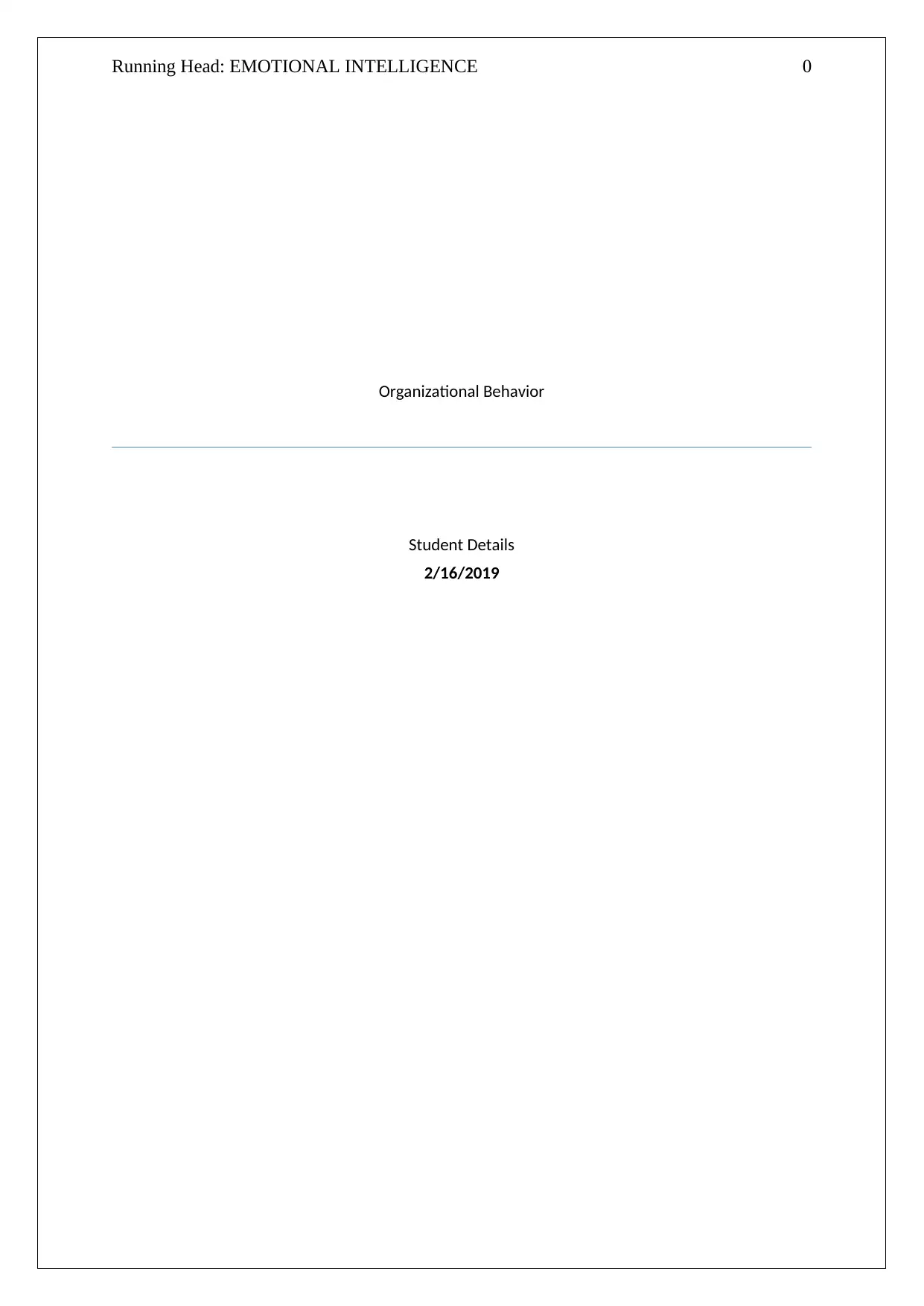
Running Head: EMOTIONAL INTELLIGENCE 0
Organizational Behavior
Student Details
2/16/2019
Organizational Behavior
Student Details
2/16/2019
Paraphrase This Document
Need a fresh take? Get an instant paraphrase of this document with our AI Paraphraser
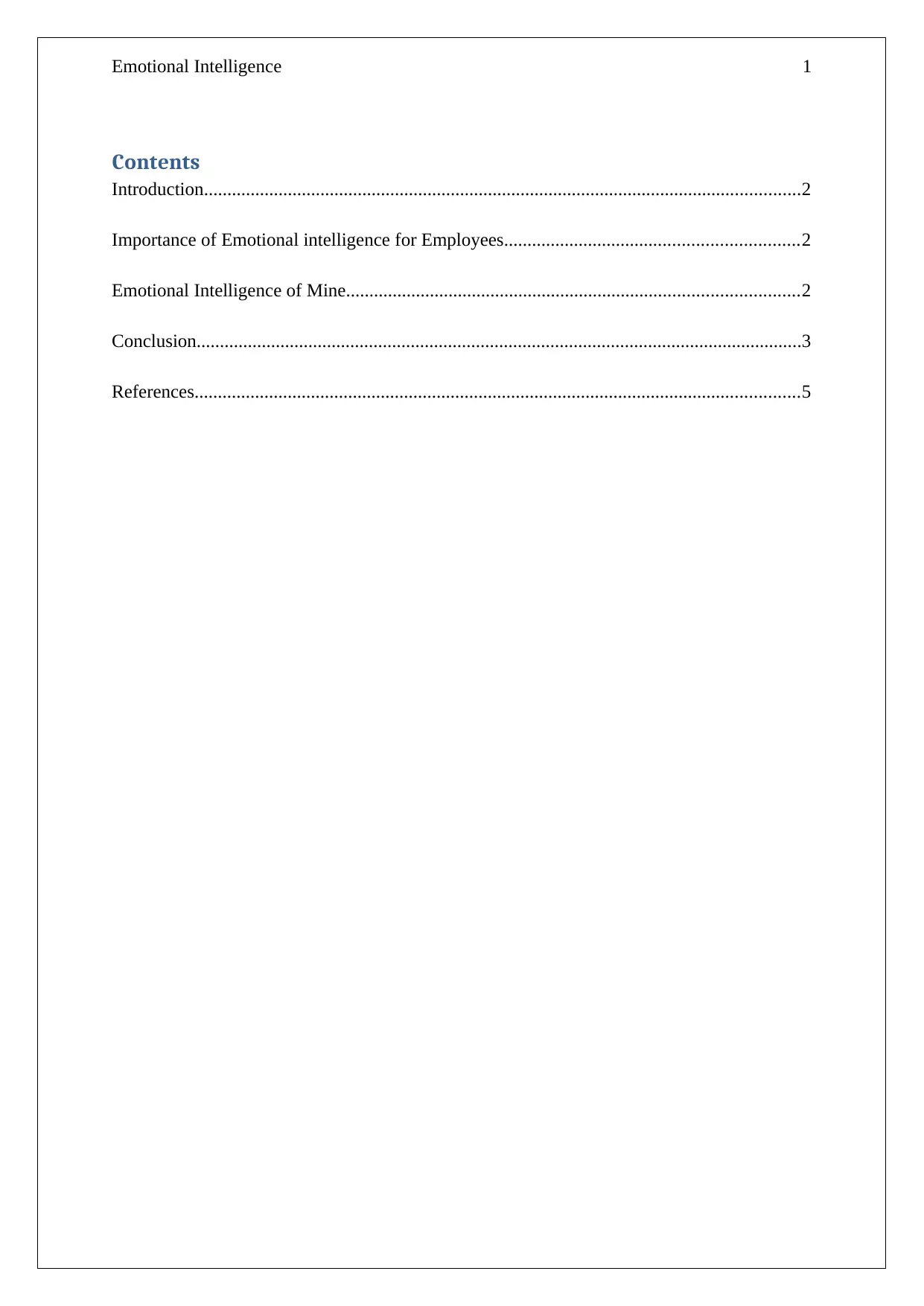
Emotional Intelligence 1
Contents
Introduction................................................................................................................................2
Importance of Emotional intelligence for Employees...............................................................2
Emotional Intelligence of Mine.................................................................................................2
Conclusion..................................................................................................................................3
References..................................................................................................................................5
Contents
Introduction................................................................................................................................2
Importance of Emotional intelligence for Employees...............................................................2
Emotional Intelligence of Mine.................................................................................................2
Conclusion..................................................................................................................................3
References..................................................................................................................................5
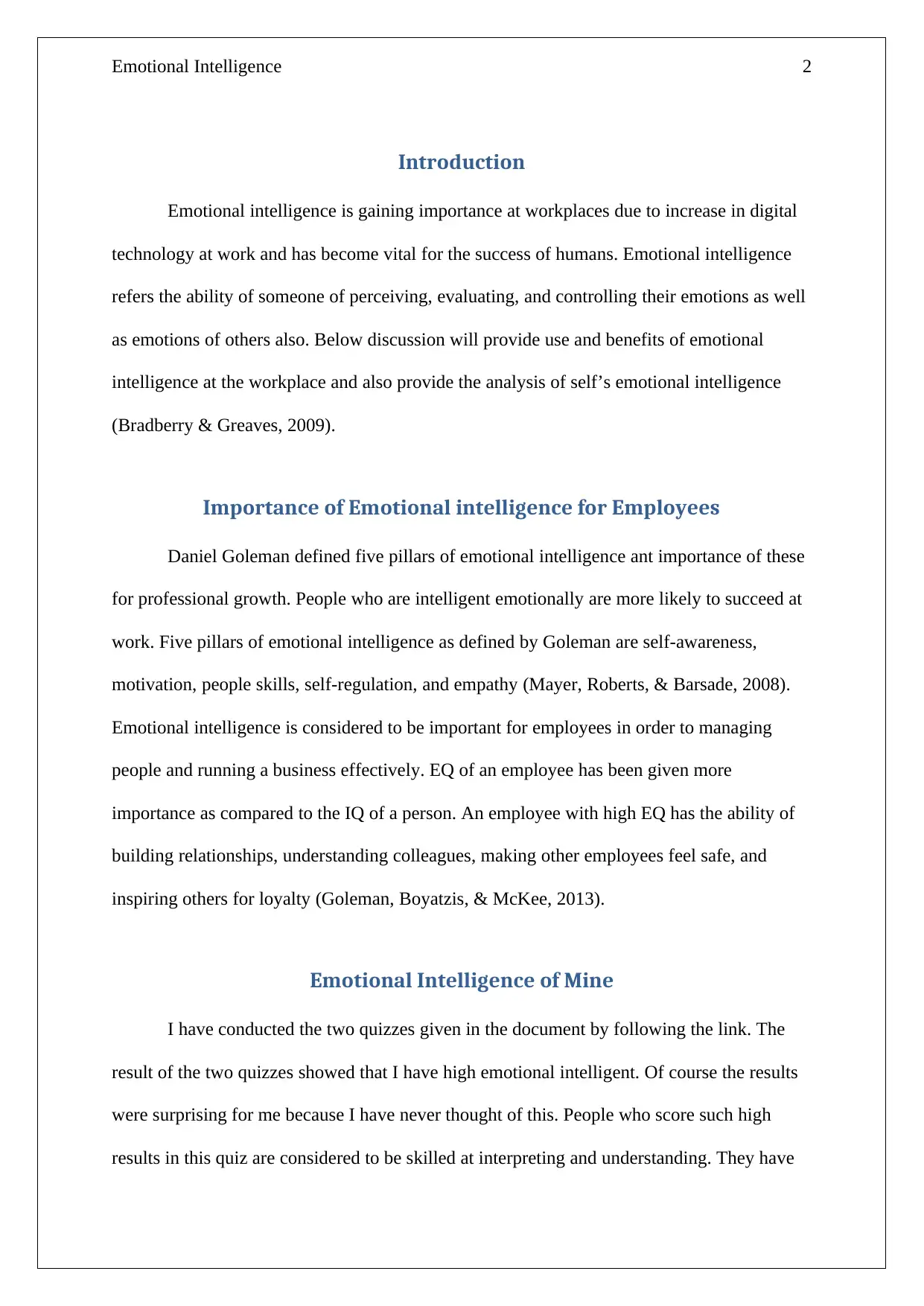
Emotional Intelligence 2
Introduction
Emotional intelligence is gaining importance at workplaces due to increase in digital
technology at work and has become vital for the success of humans. Emotional intelligence
refers the ability of someone of perceiving, evaluating, and controlling their emotions as well
as emotions of others also. Below discussion will provide use and benefits of emotional
intelligence at the workplace and also provide the analysis of self’s emotional intelligence
(Bradberry & Greaves, 2009).
Importance of Emotional intelligence for Employees
Daniel Goleman defined five pillars of emotional intelligence ant importance of these
for professional growth. People who are intelligent emotionally are more likely to succeed at
work. Five pillars of emotional intelligence as defined by Goleman are self-awareness,
motivation, people skills, self-regulation, and empathy (Mayer, Roberts, & Barsade, 2008).
Emotional intelligence is considered to be important for employees in order to managing
people and running a business effectively. EQ of an employee has been given more
importance as compared to the IQ of a person. An employee with high EQ has the ability of
building relationships, understanding colleagues, making other employees feel safe, and
inspiring others for loyalty (Goleman, Boyatzis, & McKee, 2013).
Emotional Intelligence of Mine
I have conducted the two quizzes given in the document by following the link. The
result of the two quizzes showed that I have high emotional intelligent. Of course the results
were surprising for me because I have never thought of this. People who score such high
results in this quiz are considered to be skilled at interpreting and understanding. They have
Introduction
Emotional intelligence is gaining importance at workplaces due to increase in digital
technology at work and has become vital for the success of humans. Emotional intelligence
refers the ability of someone of perceiving, evaluating, and controlling their emotions as well
as emotions of others also. Below discussion will provide use and benefits of emotional
intelligence at the workplace and also provide the analysis of self’s emotional intelligence
(Bradberry & Greaves, 2009).
Importance of Emotional intelligence for Employees
Daniel Goleman defined five pillars of emotional intelligence ant importance of these
for professional growth. People who are intelligent emotionally are more likely to succeed at
work. Five pillars of emotional intelligence as defined by Goleman are self-awareness,
motivation, people skills, self-regulation, and empathy (Mayer, Roberts, & Barsade, 2008).
Emotional intelligence is considered to be important for employees in order to managing
people and running a business effectively. EQ of an employee has been given more
importance as compared to the IQ of a person. An employee with high EQ has the ability of
building relationships, understanding colleagues, making other employees feel safe, and
inspiring others for loyalty (Goleman, Boyatzis, & McKee, 2013).
Emotional Intelligence of Mine
I have conducted the two quizzes given in the document by following the link. The
result of the two quizzes showed that I have high emotional intelligent. Of course the results
were surprising for me because I have never thought of this. People who score such high
results in this quiz are considered to be skilled at interpreting and understanding. They have
⊘ This is a preview!⊘
Do you want full access?
Subscribe today to unlock all pages.

Trusted by 1+ million students worldwide
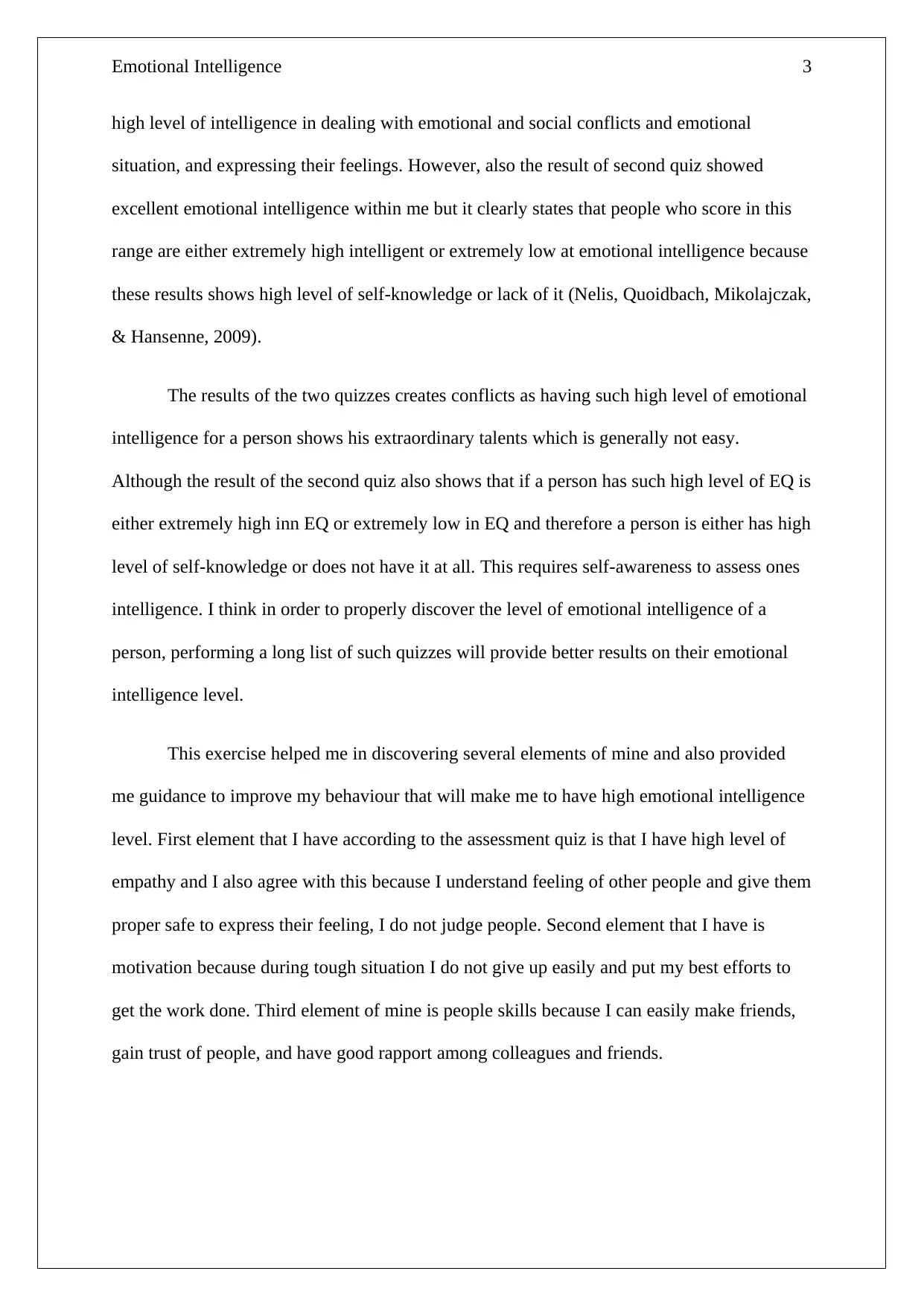
Emotional Intelligence 3
high level of intelligence in dealing with emotional and social conflicts and emotional
situation, and expressing their feelings. However, also the result of second quiz showed
excellent emotional intelligence within me but it clearly states that people who score in this
range are either extremely high intelligent or extremely low at emotional intelligence because
these results shows high level of self-knowledge or lack of it (Nelis, Quoidbach, Mikolajczak,
& Hansenne, 2009).
The results of the two quizzes creates conflicts as having such high level of emotional
intelligence for a person shows his extraordinary talents which is generally not easy.
Although the result of the second quiz also shows that if a person has such high level of EQ is
either extremely high inn EQ or extremely low in EQ and therefore a person is either has high
level of self-knowledge or does not have it at all. This requires self-awareness to assess ones
intelligence. I think in order to properly discover the level of emotional intelligence of a
person, performing a long list of such quizzes will provide better results on their emotional
intelligence level.
This exercise helped me in discovering several elements of mine and also provided
me guidance to improve my behaviour that will make me to have high emotional intelligence
level. First element that I have according to the assessment quiz is that I have high level of
empathy and I also agree with this because I understand feeling of other people and give them
proper safe to express their feeling, I do not judge people. Second element that I have is
motivation because during tough situation I do not give up easily and put my best efforts to
get the work done. Third element of mine is people skills because I can easily make friends,
gain trust of people, and have good rapport among colleagues and friends.
high level of intelligence in dealing with emotional and social conflicts and emotional
situation, and expressing their feelings. However, also the result of second quiz showed
excellent emotional intelligence within me but it clearly states that people who score in this
range are either extremely high intelligent or extremely low at emotional intelligence because
these results shows high level of self-knowledge or lack of it (Nelis, Quoidbach, Mikolajczak,
& Hansenne, 2009).
The results of the two quizzes creates conflicts as having such high level of emotional
intelligence for a person shows his extraordinary talents which is generally not easy.
Although the result of the second quiz also shows that if a person has such high level of EQ is
either extremely high inn EQ or extremely low in EQ and therefore a person is either has high
level of self-knowledge or does not have it at all. This requires self-awareness to assess ones
intelligence. I think in order to properly discover the level of emotional intelligence of a
person, performing a long list of such quizzes will provide better results on their emotional
intelligence level.
This exercise helped me in discovering several elements of mine and also provided
me guidance to improve my behaviour that will make me to have high emotional intelligence
level. First element that I have according to the assessment quiz is that I have high level of
empathy and I also agree with this because I understand feeling of other people and give them
proper safe to express their feeling, I do not judge people. Second element that I have is
motivation because during tough situation I do not give up easily and put my best efforts to
get the work done. Third element of mine is people skills because I can easily make friends,
gain trust of people, and have good rapport among colleagues and friends.
Paraphrase This Document
Need a fresh take? Get an instant paraphrase of this document with our AI Paraphraser
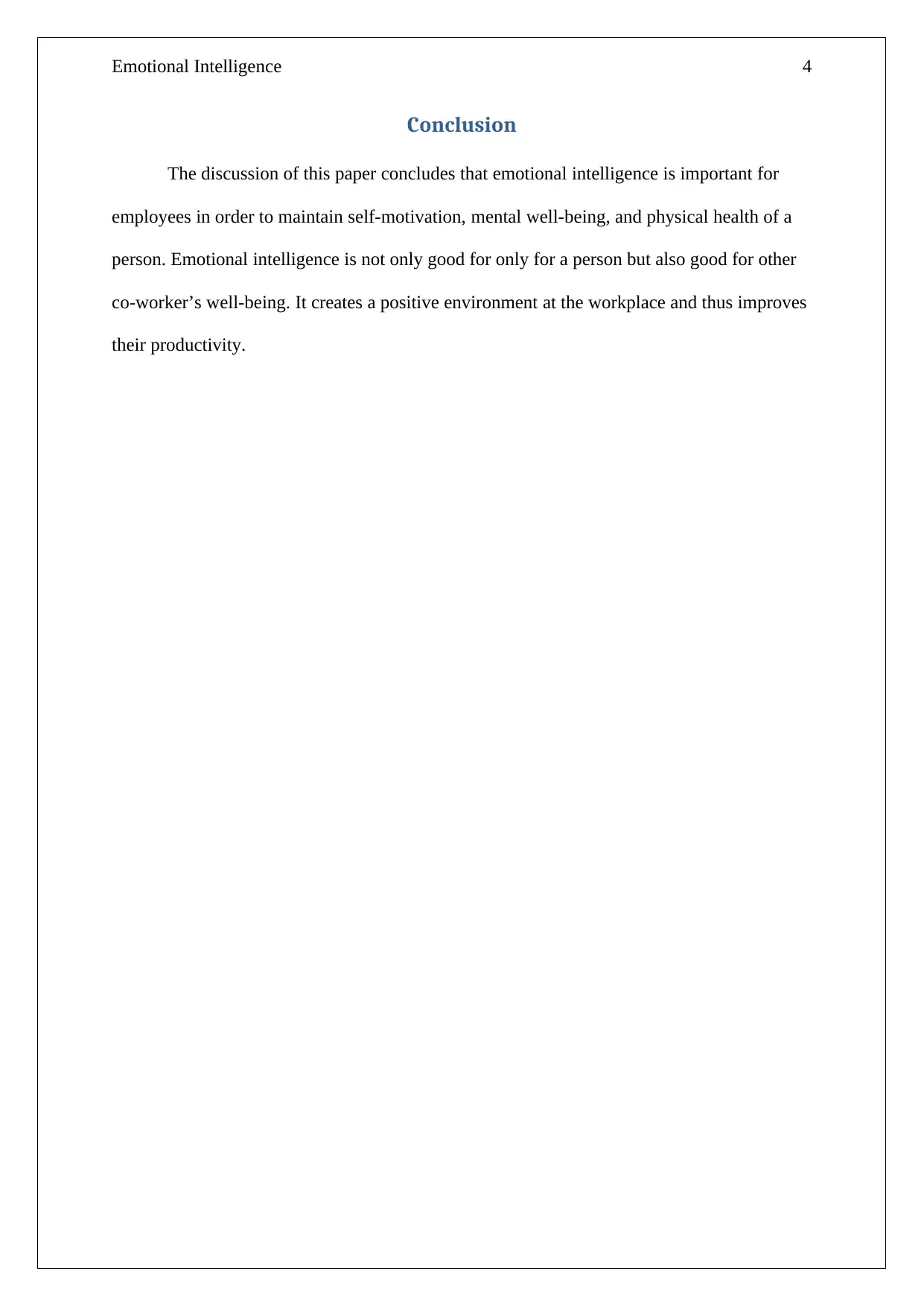
Emotional Intelligence 4
Conclusion
The discussion of this paper concludes that emotional intelligence is important for
employees in order to maintain self-motivation, mental well-being, and physical health of a
person. Emotional intelligence is not only good for only for a person but also good for other
co-worker’s well-being. It creates a positive environment at the workplace and thus improves
their productivity.
Conclusion
The discussion of this paper concludes that emotional intelligence is important for
employees in order to maintain self-motivation, mental well-being, and physical health of a
person. Emotional intelligence is not only good for only for a person but also good for other
co-worker’s well-being. It creates a positive environment at the workplace and thus improves
their productivity.
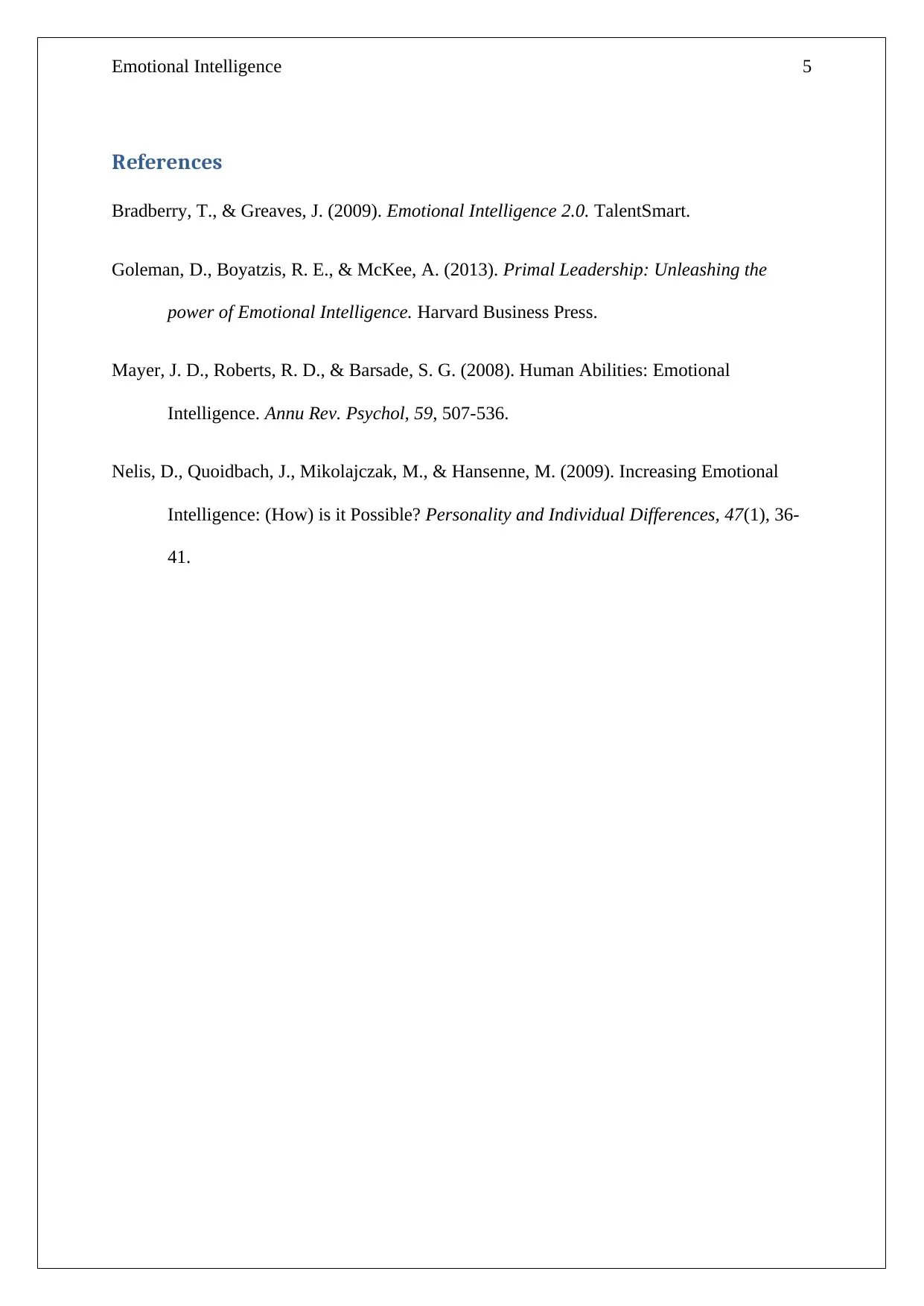
Emotional Intelligence 5
References
Bradberry, T., & Greaves, J. (2009). Emotional Intelligence 2.0. TalentSmart.
Goleman, D., Boyatzis, R. E., & McKee, A. (2013). Primal Leadership: Unleashing the
power of Emotional Intelligence. Harvard Business Press.
Mayer, J. D., Roberts, R. D., & Barsade, S. G. (2008). Human Abilities: Emotional
Intelligence. Annu Rev. Psychol, 59, 507-536.
Nelis, D., Quoidbach, J., Mikolajczak, M., & Hansenne, M. (2009). Increasing Emotional
Intelligence: (How) is it Possible? Personality and Individual Differences, 47(1), 36-
41.
References
Bradberry, T., & Greaves, J. (2009). Emotional Intelligence 2.0. TalentSmart.
Goleman, D., Boyatzis, R. E., & McKee, A. (2013). Primal Leadership: Unleashing the
power of Emotional Intelligence. Harvard Business Press.
Mayer, J. D., Roberts, R. D., & Barsade, S. G. (2008). Human Abilities: Emotional
Intelligence. Annu Rev. Psychol, 59, 507-536.
Nelis, D., Quoidbach, J., Mikolajczak, M., & Hansenne, M. (2009). Increasing Emotional
Intelligence: (How) is it Possible? Personality and Individual Differences, 47(1), 36-
41.
⊘ This is a preview!⊘
Do you want full access?
Subscribe today to unlock all pages.

Trusted by 1+ million students worldwide
1 out of 6
Related Documents
Your All-in-One AI-Powered Toolkit for Academic Success.
+13062052269
info@desklib.com
Available 24*7 on WhatsApp / Email
![[object Object]](/_next/static/media/star-bottom.7253800d.svg)
Unlock your academic potential
Copyright © 2020–2026 A2Z Services. All Rights Reserved. Developed and managed by ZUCOL.




